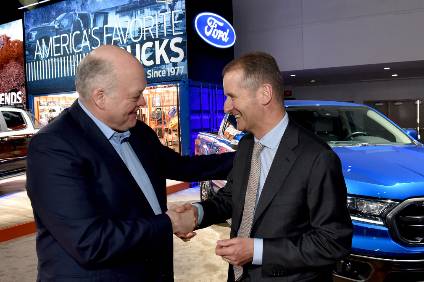Many in the automotive sector agree that collaborations among car companies are one way for them to shape up for the big challenges ahead and potential disruption to a basic business model (OEM manufactures vehicle, it is shipped to dealer for retail and final customer is a vehicle owner) that has held sway for more than a century. And so the latest such coming together is that of Ford and Volkswagen. The two are agreeing, to begin, a collaboration in CVs and pickups. They have collaborated before. The AutoEuropa plant at Setubal in Portugal made the Ford Galaxy MPV alongside the VW Sharan and Seat Alhambra. Eventually, Ford left the arrangement, preferring to shift Galaxy manufacturing to the Genk plant in Belgium – where it shared platform with Mondeo.
A question is how far a company wants to sacrifice ownership and control of key technologies and IP in return for much lower costs.That perhaps serves as a reminder that plant-product mix is something that OEMs like to have control over as it’s such a vital part of the business cost and performance structure. There are many instances of joint ventures in vehicle manufacturing that eventually ran out of steam for one reason or another. Arguments between partners over who does what and the degree of product differentiation applying to multi-branded vehicles are not exactly unheard of (I recall an OEM engineer giving a lengthy presentation on the differences between his brand’s model and the others made at the same plant – he wasn’t too complimentary about the partner’s product).
A question is how far a company wants to sacrifice ownership and control of key technologies and IP in return for much lower costs.
It will be interesting to see, then, how far the cooperation between Ford and VW goes. One important driver now is the need to save on cost as OEMs experience much higher investment costs in advanced technologies such as electrification and autonomous/automated drive. Again, a question is how far a company wants to sacrifice ownership and control of key technologies and IP in return for much lower costs. It seems to be a trade-off that has been shifting though (see also, BMW and Daimler JV in mobility services).
Ford and Volkswagen announce commercial vehicle alliance
The auto industry’s most celebrated collaborative structure between OEMs is the Renault-Nissan-Mitsubishi Alliance. It appeared to work so well because it allowed its participants a high degree of independence, even as they exploited scale economies and cost savings. But the pressures to integrate further were always there, political tensions simmering under the surface, especially as the companies’ relative positions in the industry changed (essentially, Nissan eventually recovered strongly from near death, but Renault stayed in the driving seat because of a cross-ownership arrangement fashioned when Nissan was on its knees). And now the Alliance’s chief architect – Carlos Ghosn – finds himself in detention in Tokyo, tensions between the two companies increasingly publicly evident.
Nissan not ready to get closer to Renault – Nissan CEO
Ghosn charges create turmoil in Renault-Nissan-Mitsubishi Alliance
As Ford chief Jim Hackett has said before, it can be a ‘delicate dance’ when two OEMs and business rivals try to come together to save cost. But it’s a dance that many more will likely seek to do, to varying degrees of success.
See also: BMW and Mercedes talks prove auto is very CASE sensitive







